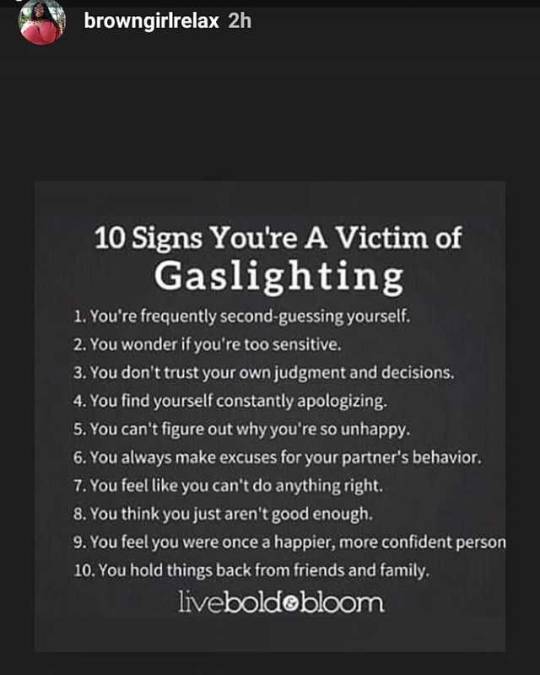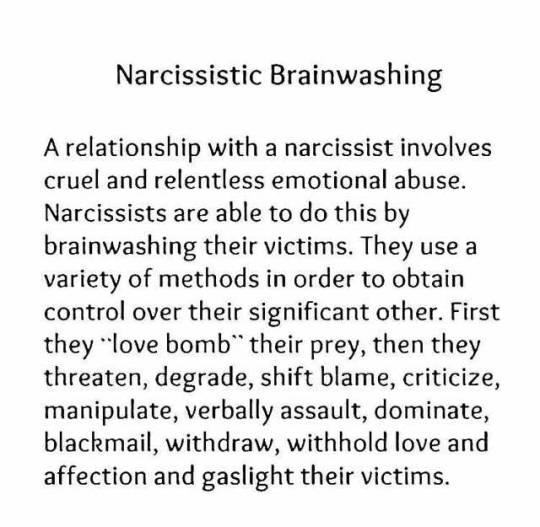#abusivepartners
Photo

Via @browngirlrelax Are you a victim of gaslighting? #gaslighting #mentalabuse #abusivepartners #abusiverelationship https://www.instagram.com/p/Bsl7CbxF1E7/?utm_source=ig_tumblr_share&igshid=rnxm1cxh10gj
0 notes
Video
Kahit ndi na sya mag go into details, makikita mong LJ was mentally abused and gaslighted by his narcissist ex... No bitterness here, posting this for awareness sa mga lalaking mahilig mambaligtad ng kwento... Danas na danas ko yan. Pag nakitaan nio na ng ganito, matic na un girls, iwan nio na. Yung tipong mapapatanong kang, hey, ganun b tlga kong klaseng tao? Ganun b tlga tingin nla skin, well to the fact na kilala mo naman sarili mo.. Pati pera, bibigyan ka pero susumbat in the end harujusko pagkakalat pang mukha kang pera omgeee.. Yung mga ganong issues ba... Pero ikaw ang iniwanan ng puro liabilities tas pagkakalat mkha k dw pera wtf... Tas cheater din.. Josko wla ka tlgang ibang kakapitan kundi panginoon kapag naka encounter ka ng taong ganito. Pde naman maging honest e, ang masaklap dun, gina gaslight kn, iba pang version sinasabi sayo, tas iba din version ang kwento pag katalikod ka, ikaw pa masama emegerd!!! Kitang kita mo ang trauma sa mukha at boses ni LJ e.. Observe the red flags, and just... GO! Bago kp malugmok, at maubos ka ng sobra sobra... #Narcissist #Awareness #AbusivePartner #Girlpower #Napapanahon https://www.instagram.com/p/CTTs5iepDfPc3qre2PHYxFnHHhR2Zp-TO8fzFM0/?utm_medium=tumblr
0 notes
Text
This a Review of In the Dream House by Carmen Maria Machado

In the Dream House: A Memoir by Carmen Maria Machado
My rating: 5 of 5 stars
Carmen Maria Machado’s memoir In the Dream House was followed by her debut collection of short stories called Her Body and Other Parties. In the latter, there’s one titled ‘Mother’, where the narrator lives a life in the subjunctive with the imagined child of her lover. The lover has abandoned both the narrator and the baby. Of the subjunctive, Carmen Maria Machado writes in Dream House—
The complete archive is mythological, possible only in theory; somewhere in Jorge Luis Borges’s Total Library, perhaps, buried under the detailed history of the future and his dreams and half dreams at dawn on August 14, 1934. But we can try. “How does one tell impossible stories?” Hartman asks, and she suggests many avenues: “advancing a series of speculative arguments,” “exploiting the capacities of the subjunctive (a grammatical mood that expresses doubts, wishes, and possibilities),” writing history “with and against the archive,” “imagining what cannot be verified.
In the Dream House is the telling of the author’s experience of living through an abusive relationship with her “petite”, “white-blonde”, and “that mix of butch and femme that drives you crazy” girlfriend. In the Dream House does not fulfil the need for a therapeutic or cathartic experience for the author. She writes, as a remark to herself, “I thought you died, but writing this, I’m not sure you did.”
Machado indicates herself- in the “you”- in second-person present throughout the term of her relationship with her lover. It is a very personal appraisal, building up her own experience not just in her own words but also in her own way of thinking about it.
The Dream House is the self-reflexive ‘You’ or Machado’s dislocated and incomplete self, as much as it is her girlfriend’s house in Iowa. It is both visceral and tangible at the same time.
Machado creates an archive from the lack of an archive. Her memoir is a beacon, shining light on living with the debilitating and isolating experience of physical and emotional abuse in a same-sex relationship. Her experience is legally uncategorized, and therefore a myth. She entitles a chapter in the book ‘Dream House as Myth’, and ends it by saying “But keeping going is a way of speaking.”
Every section of the book is a lush accomplishment in keeping going and speaking at the same time. The sections in the book are each a narrative genre or a trope- ‘Dream House as Erotica’, ‘Dream House as Famous Last Words’, ‘Dream House as Deja Vu’, ‘Dream House as Tragedy of the Commons’- like a list of rooms in the Dream House that were not supposed to be there, but Machado keeps finding them as involuntarily as the next day. She annotates her text with leitmotifs from folk-tales and fairy-tales. Tales they are and Machado is piercingly on point in translating the urgency her memoir demands through motifs from tales.
This book reminds me of a line from Freshwater by Emezi Akwaeke. In Freshwater, Akwaeke writes of the protagonist Ada- “She was good at other things too—crying, for example, which filled her with purpose, replenished all those little crevices of empty.” Reading In the Dream House feels like being forsaken to account for the unaccounted for empty spaces.
Machado’s memoir is wave after wave of brutally honest epithets that have the power to be as uncharacteristically mutilating as while talking about an episode from Star Trek, or as intact as the socio-cultural-political realities that permeate her memoir.
View all my reviews
#carmen maria machado#memoir#in the dream house#dreamhouse#genre#motif#trope#samesexabuse#abusivepartner#lambda literary awards
0 notes
Text
Educate yourself about abusive relationships, learn about the psychological terminology and know the signs right in front of your eyes. Abuse is not temporary anger or spitefullness, it is constant deceit and manipulation that will only inflict harm. No good comes from tolerating abuse of even the slightest sort.

#abusiverelationships#abusesurvivor#survivor#recovery#healing#emotionalabuse#mentalabuse#narcissisticabuse#narcissisticabusesurvivor#physicalabuse#isurvived#free#psycologicalabuse#substanceabuse#abusivepartner#abusiveex#sociopath#knowthesigns#cheating#narcissisticabuseisreal#broken#distrust#mentally unstable#mental disorder#survivorofthestorm#survivalstory#lovebombing#threats#degrading#blame
0 notes
Photo

Photo from:
Ford, C. (2017). The Power of Domestic Violence: Why It’s Hard to Leave. Retrieved from https://womensvoicesforchange.org/the-power-of-domestic-violence-why-its-hard-to-leave.htm
“Why doesn't she just leave”
Intimate partner violence and homelessness are two interconnected, significant issues that deeply affect many women across Canada (Tutty, Ogden, Giurgiu, & Weaver-Dunlop, 2013). The decision to leave an abusive relationship is greatly impacted by the lack of affordable and safe housing available (Tutty et al., 2013). Housing specifically has been identified as the most consequential concern, one that provokes the return to an abusive partner (Tutty et al., 2013). I question why the systems put in place make it so difficult for women and their children to obtain the resources that would allow them to live in stability, separate from their abusive partners. It has become evident that leaving an abusive partner does not always ensure a sanctuary of safety will be waiting. In fact, for many abused women, fleeing brings them on a path towards homelessness (Tutty et al., 2013). Inadequacies within our social assistance programs result in the majority of social funds being put towards housing, with little to nothing left for the many other necessities of life (Tutty et al., 2013). When all fails and emergency shelters are used as a last resort, their resources only act as a temporary solution, and are extremely constrained to the amount of assistance they are able to provide (Tutty et al., 2013). I think that our government is naive in thinking that the programs put in place are anything more than a short term relief. These women face a tremendous amount of barriers that keep them from obtaining permanent housing. Funding is extremely low, and without sufficient economic backing these women are forced to either live on the streets or live under the roof of their abuser. The fact is that our systems choose the abuser over the victim, highlighting a devastating issue of injustice that must be addressed.
Tutty, L., Ogden, C., Giurgiu, B., & Weaver-Dunlop, G. (2013). I Built My House of Hope. Violence Against Women, 19(12), 1498-1517. http://dx.doi.org/10.1177/1077801213517514
0 notes
Text
Am I being emotionally abused?

It can be difficult to identify whether you are being emotionally abused. This is because emotional abuse becomes normalised over time. Often, emotional abuse starts slowly. It'a 'drip-drip' process that gradually limits your sense of self and leaves you wondering what's wrong with you. Self-doubt is common for those living with emotional abuse.
One common characteristic of emotional abuse is that the individuals find they regularly question themselves. They wonder whether they are wrong, too sensitive or imagining things. Underneath all the rumination is a sense that something is 'off'. Most individuals give their emotional abuser the benefit of the doubt and the cycle continues.
Emotionally abused individuals often have low self-esteem or confidence issues. An abuser seems to pick up on this like a heat-seeking missile. Emotionally abused people also tend to show codependent characteristics - they are nurturers and want to fix their partners. Abusers tend to go for people who they feel will be easy to manipulate. I've written this blog post to help you pinpoint what's really going on and to guide you to a decision on whether you are being emotionally abused.
You receive subtle putdowns
The nature of domestic abuse has changed. Thirty or forty years ago, domestic abuse wasn't spoken about as much whereas nowadays the police are far more aware of the issues and there are harsher consequences for the perpetrators.
#abusivebehaviour #abusivepartner #abusiverelationship #domesticabuse #emotionalabuse #emotionallyabused #mentalabuse #mentalhealth #violentrelationship
Read the full article
0 notes
Text
Tips for self-isolating with an abusive partner
1. Talk to a family law lawyer: Depending on your circumstances, a family law lawyer can assess if bringing an Emergency Motion is the best move for you to protect your safety and also go over a safety plan with you.

2. Web History: Frequently clear your search history if you are searching for ways to stay safe or resources in the event your partner gets a hold of your browser or cell phone and checks your history.
0 notes
